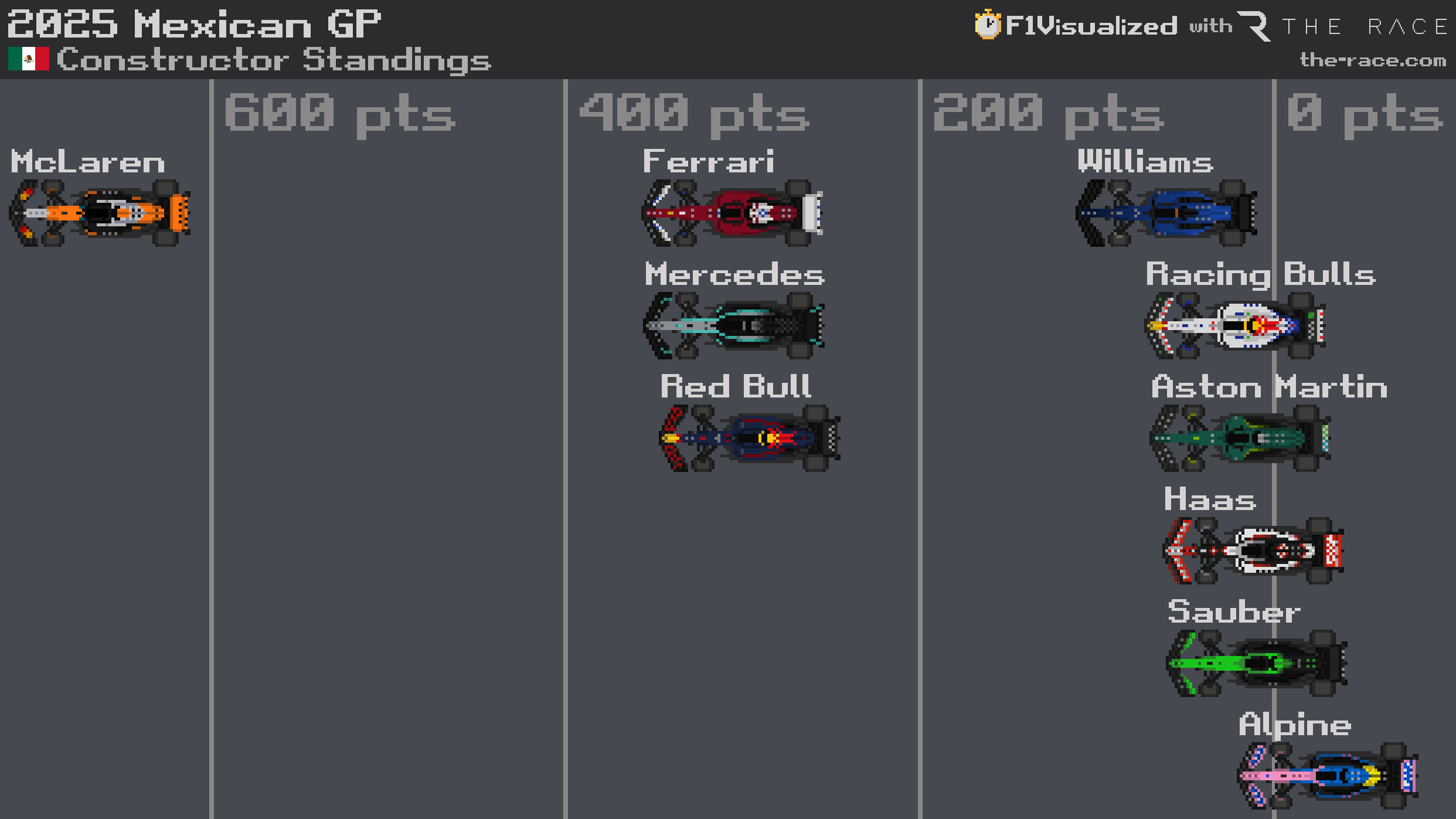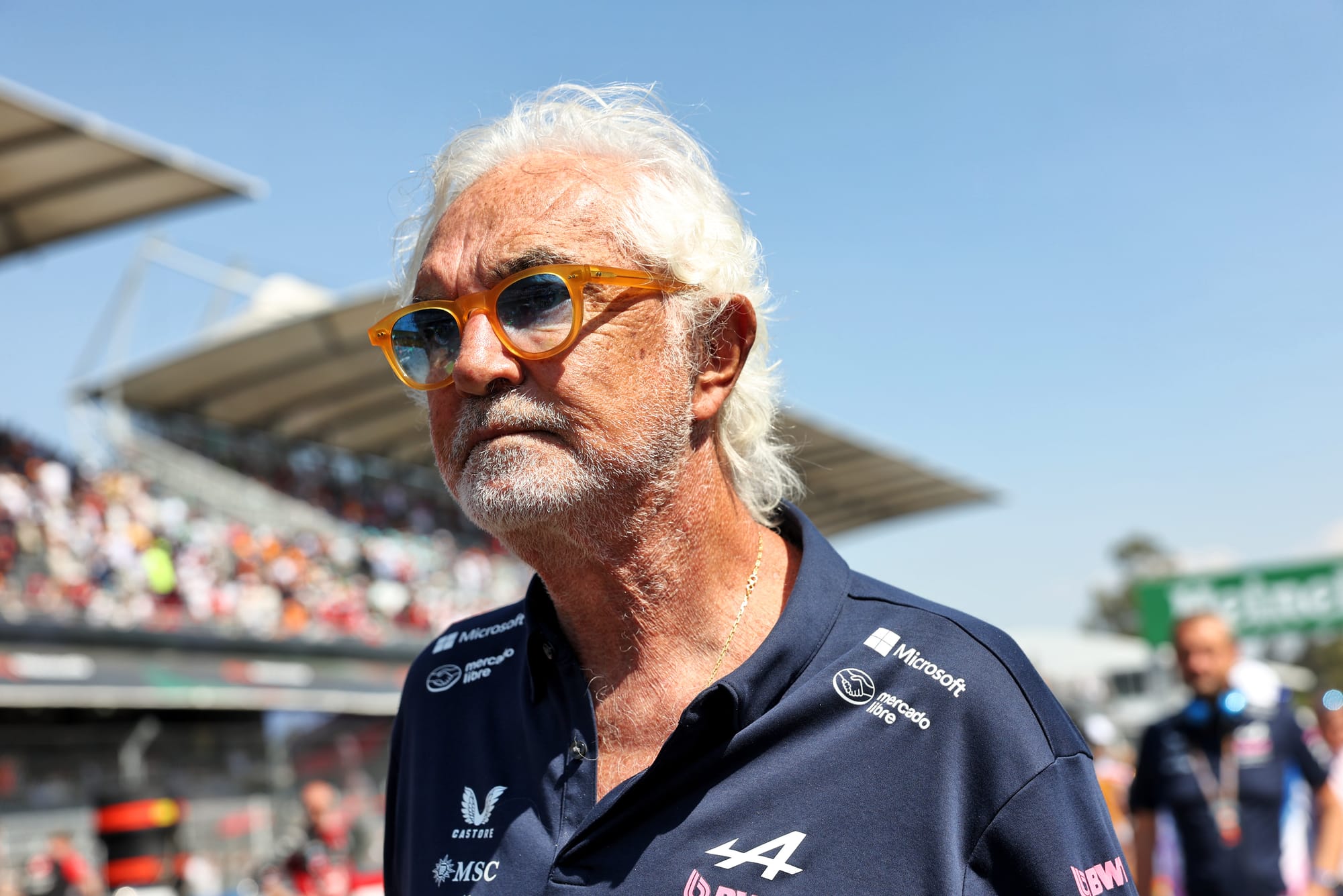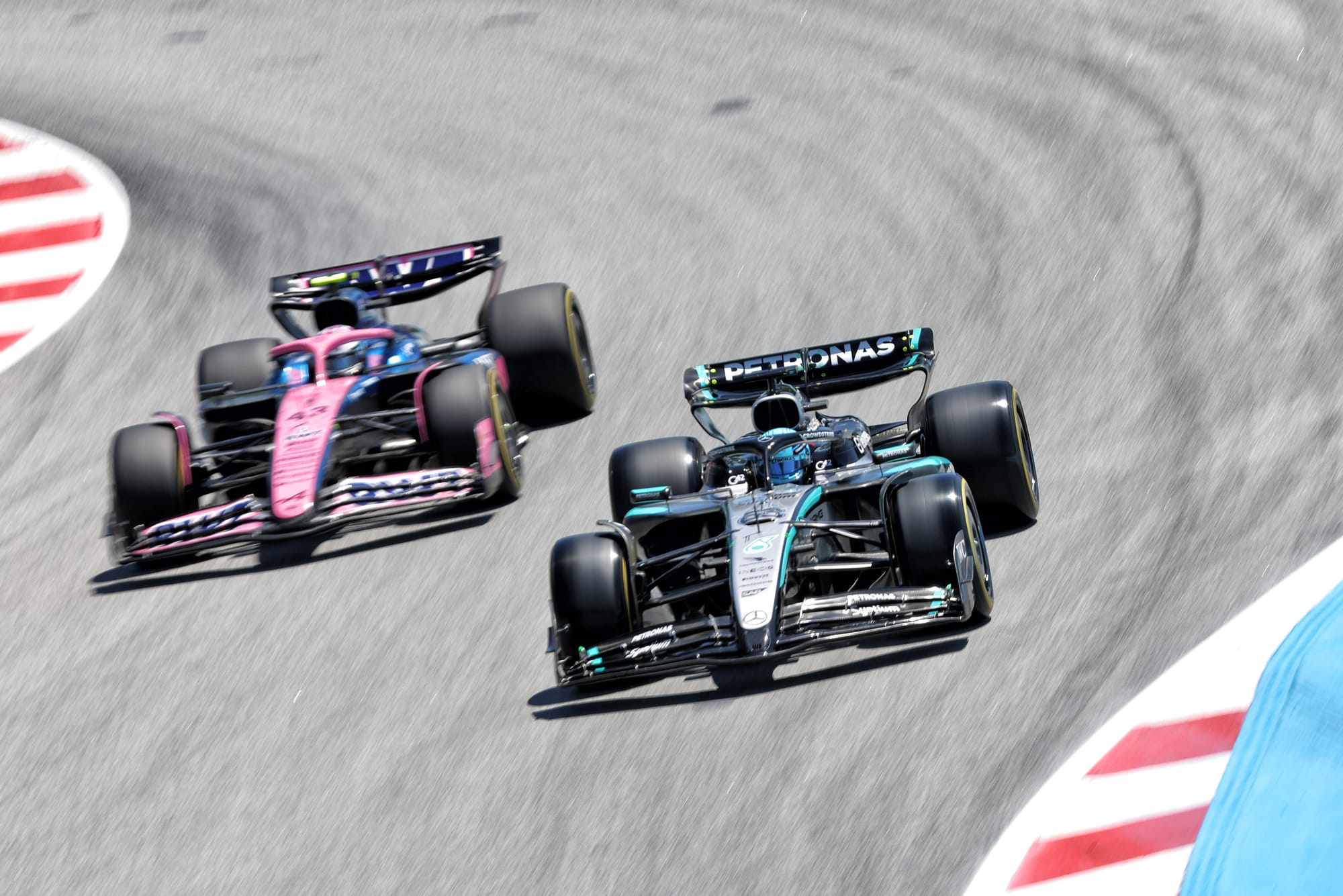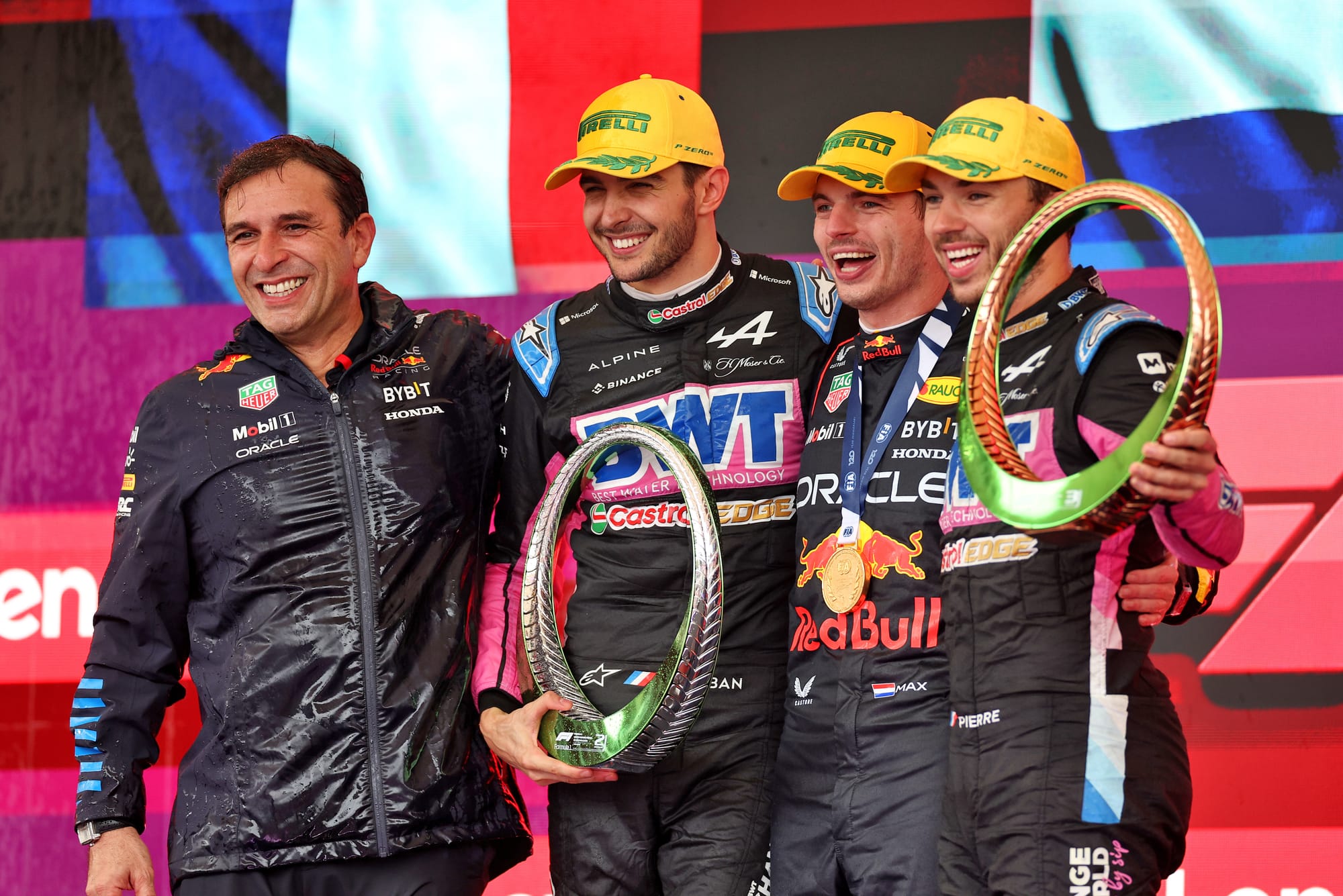Twelve months on from its shock double podium in Brazil, Alpine is not pretending that there is much hope of a repeat as Formula 1 returns to Sao Paulo this weekend.
Sitting well adrift at the bottom of the constructors’ championship, a lack of in-season development has left Pierre Gasly and Franco Colapinto enduring a year of steadily drifting down the order with little hope of a short-term turnaround.

The team's executive advisor - and de facto boss - Flavio Briatore has acknowledged the complete lack of 2025 development was perhaps too extreme.
But he also argues - in a rare, exclusive interview with The Race - that the root cause of all the problems goes back much, much further, to decisions made even before Renault took back ownership of the team, right at the start of the hybrid rules era.
It is all a far cry from this time last year, where Esteban Ocon and Gasly finished second and third respectively at Interlagos to help secure a constructors’ championship cash bonus worth more than $30million and hope of a brighter future.
But things did not get better. Alpine’s troubled 2025 campaign marks a low point not only for Renault in F1 but the 'Team Enstone' organisation itself.
There have been challenging campaigns in the past, like 2016 - under the Renault name - when it finished ninth, or eighth in 2014. It has never propped up the constructors’ table before, though.
In fact, so tough are things right now that its executive advisor Flavio Briatore has labelled the experience as its ticks off the races until a hopefully brighter future begins in 2026 as “torture”.
Discussing with The Race what is happening at Alpine, Briatore said that he hopes that the short-term pain of abandoning work on this year’s car early will result in it getting a proper headstart when the 2026 season kicks off in Melbourne.
“We are here for winning,” he said. “We are not to be a tourist to go around the world.
“It's very hard, this situation for us. I'm not used to it. I was used to it 20 years ago, but now every Sunday is torture.
“You have no chance. You arrive in places and you see the mechanics put the garage together, working very hard. Then you watch all these people doing the best effort as possible, and you don't have the possibility to enjoy the race, to go back home with the points.
“It's very frustrating. I hope next year we pay everything back double!”
A question of resources

So why have things turned out like this?
In one sense, the explanation for Alpine’s troubled 2025 campaign is quite simple.
In a bid to capitalise on the opportunities of a switch to becoming a Mercedes customer team next year, it elected to stop development of its current car as soon as it could.
The hope was that by committing everything to the 2026 project super early, it will be well ahead of other teams that carried on with upgrading their current cars.
It is the playbook that helped turn Honda from limping home to ninth in the standings in 2008 to world champion the following year under the Brawn banner and a new set of regulations.
But the past does not guarantee future results, and there is no certainty that Alpine’s tactic will definitely pay off, especially as many other teams are convinced they have been able to juggle resources across this year to avoid compromising their future cars.
From Briatore’s perspective, however, the “risk” it has taken is more logical as it was not in the state needed to run parallel development programmes.
“We don't have the capacity to develop the 2025 car and a 2026 car,” he said, as he reckoned that improving the A525 would only have netted eighth or ninth in the constructors’ fight anyway.
“That was our belief when we made the decision, but it was a bit of an underestimation because everybody has done a better job than us.
“In the beginning our car was P6/P5. After that, everybody improved the car a lot, and we are not where we expected. So that is why we took the risk to put all the effort into the 2026 car.”
More than just the car
But there are bigger issues at play for Alpine than just the decision to halt development of its A525.
Much talked about management instability has overshadowed things for years at Alpine, and was cited by Briatore as one of the things he told former Renault CEO Luca de Meo as a problem when they were discussing him coming on board last season.
Briatore sees the situation that Alpine is in now as a consequence of decisions that have not been made under his watch.
Instead, he thinks there are two parallel factors that have come into play; one of which can be traced back to calls made more than one decade ago.
Briatore observed from the outside, even before he accepted the offer from de Meo, was that Alpine had been suffering because its management had lacked consistency, and it had to be run properly, hands-on, in Enstone.
“I knew Luca much before F1, and at one point to see the team Renault like that was really difficult, because it was my team,” he said.
“You know, I'm back in Enstone in the same office as 20 years ago. I've been three times in this team!
“We discussed, and I said to Luca that if you need some help, I will help you because I'm disappointed.
"The team was managed by people from France, from Paris. F1 is already difficult to manage day by day in the office, in Enstone. So managing F1 from Paris is impossible.”
The engine issue

The real elephant in the room was the engine, with Renault having not set the benchmark in the turbo hybrid era as it had under previous rules sets.
Falling behind its rivals, and perhaps having little hope of moving to the front with the new 2026 rules, set in motion the moves that ended up with de Meo pulling the plug on the F1 power unit project and committing Alpine to become Mercedes customers.
From Briatore’s perspective, the blame for Renault not delivering with its turbo hybrid was nothing to do with the job being done by current staff at its Viry-Chatillon base.
Instead, it was because he felt that everyone at Viry had effectively been operating with one hand behind their back because Renault had not committed the right resources needed to make a success of the current rules.
And that is a decision that stretches back to the early 2010s under then Renault CEO Carlos Ghosn, when the company set out its stall for the switch to hybrid rules from 2014.
As Briatore explained: “With the new rules for the engine, maybe at the time, Renault was not taking seriously to match the cost of making an engine like the Federation [FIA] wanted.
“Everybody else was investing a lot of money. You're talking about Mercedes, Honda and Ferrari. Renault was like stay [the same investment] like it was OK.
“I am not pointing [the blame] at somebody, I think it just happened like that. At the time the president was Carlos Ghosn, and maybe the management had no balls to tell Carlos about being serious to do F1. Now we have the result.
“In the meantime, I think, Renault did the best that was possible. But if you don't have a resource, then it's very difficult to be competitive. Viry did the best as possible. [Bruno] Famin was here, he did the best as possible.”
Briatore insists that there was nothing personal in the move to swap Renault for Mercedes engines. Instead it was a pragmatic call fuelled by his long-held belief that if you are going to succeed in F1 then you need the best ingredients everywhere.
He points out that in the past it worked the other way too, as he ended up buying the Ligier team himself in 1994 in a bid to secure for Benetton a Renault engine deal that rival Williams had blocked.
“I remember I was fighting like crazy to have the engine of Renault in '95 because Williams blocked me to have the engine,” he said.
“So at the time, Renault had the best engine in F1. To have a Renault engine, I bought Ligier myself. I take away the engine from Ligier, I give it to Benetton, and then I give to Ligier the Honda [Mugen] engine.
“For me, Renault was representing the best engine in the world. In '95, we won 80% of the races with the Renault engine [Renault engines won 16 of 17 grands prix in 1995, 11 of them with Benetton (64.71%)].
“So I know for Renault, it was a difficult choice [to shut down the Viry F1 project]. But if you want to be competitive, you need to have the same weapon everybody has.”
Sniffing the podium

With the Mercedes engine for next year, Briatore believes Alpine’s fortunes can be transformed. He is not suggesting a Brawn style shock of getting into championship contention, but he thinks it can set sights on some surprises.
“I want us to be in the first six [on the grid],” he said. “When you're sixth/seventh, you start the race, and you smell the podium already.
“When you are 14th/15th, forget it. My dream, if you want, is to be competitive, to be at this kind of level.”
Some may question whether even those aspirations for next year are realistic considering how far back Alpine is coming from right now. But if there is one thing that Briatore loves beyond all else, it is proving doubters wrong.
Reflecting on the task ahead, he said he has always faced sceptics - and loved results doing the talking.
“It's a big, big, big, big challenge. But I’ve never had a small challenge," he said.
“With Benetton, the people were laughing because we were a T-shirt maker. I remember [former McLaren boss] Ron Dennis, he told me that I don't have motorsport in my stomach.
“Then, in the meantime, we were winning the races with no motorsport in the stomach.”



